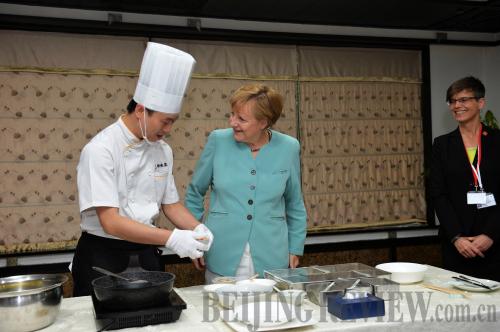|
 |
|
SICHUAN STYLE: German Chancellor Angela Merkel learns to cook the signature Chinese dish Kung Pao Chicken in Chengdu, capital of Sichuan Province, during her visit to China on July 6 (XINHUA) |
As China's growth rate has moderated in recent years, some countries are expressing concerns about the future of the Chinese economy. However, the German business community has demonstrated a consistent confidence in China. It is estimated that German exports to China this year will increase 8 percent year on year. Statistics from a survey of the German Chamber of Commerce in China showed that more than half of German enterprises believe that China's economic development environment will continue to improve as its economic transformation speeds up.
In a speech at Beijing-based Tsinghua University on July 8, Merkel said the relatively slowing pace of the Chinese economy is understandable as growth rates vary in the different regions of China.
The Chinese economy is still full of vitality and its western region features particularly fast growth, Merkel said. She added German companies would like to participate in the development of central and west China. Additionally, Germany welcomes Chinese investment and will make efforts to streamline visa processes to facilitate personnel exchanges.
In her speech, Merkel also noted that the entire world will benefit from a healthy Chinese economy. She maintained the Chinese Government's policies could affect the whole world, including Germany.
Cui noted that China and Germany have set up a major framework for economic cooperation that includes big plans for the "green economy." Great cooperation potential lies ahead in the fields of new energy, environmental protection as well as China's urbanization.
Ji Mingkui, a professor of international studies at China's National Defense University in Beijing, said Merkel's high-frequency visits to China showcase the importance Germany attaches to China.
Germany is currently China's largest trading partner in Europe, while China is Germany's number-two export market outside Europe after the United States. Two-way trade volume stood at $161.6 billion last year, accounting for nearly one third of the combined total between China and EU countries.
Ji said the sound state of Sino-German economic relations lies in the fact that the two countries have complementary economies. Germany provides China with products it needs for industrialization, such as machines, specialty chemicals and electronic goods; meanwhile, reasonably priced Chinese consumer goods are in high demand in Germany.
Chinese and German companies signed a number of agreements during Merkel's visit, including deals to buy helicopters from Germany. The two sides agreed to establish a new manufacturing base for a joint venture between China's FAW Group and Volkswagen. They also decided to build an "ecopark" in Qingdao, east China's Shandong Province, that will showcase energy-efficient buildings. Air China, a leading Chinese air carrier, signed an agreement with its Star Alliance partner, German airline Lufthansa.
Setting an example
It is worth noting that Merkel's China trip came at a time when China marked the 77th anniversary of the start of the War of Resistance Against Japanese Aggression (1937-45). While Merkel's visit was unrelated to the event, the attitudes of Germany and Japan toward their wartime history stand in stark contrast to one another.
In her address at Tsinghua University, Merkel said she did not have the right to comment on the Japanese Government, but added that from Germany's point of view, it is important "not to let the tragic history repeat."
Merkel told Chinese students that after World War II the German people reflected upon their actions during the war. "Every one of us has to reflect on what we have done wrong," Merkel said of Germany's handling of World War II, adding that many young Germans in the 1960s asked their parents about what life was like under the Nazis.
"It is a painful process, but it is the right thing to do. The new generation also has to face history, and this is crucial to avoid repeating mistakes," Merkel noted.
Though Merkel was merely reiterating Germany's stance on its wartime history, observers said Japan should draw a lesson from Germany in how to handle its own historical issues and foreign relations.
Email us at: yulintao@bjreview.com | 